|
Limitar tu búsqueda
[+–] Editorial
[+–] Fecha
[+–] Formato
[+–] Idioma
[+–] Tipo de documento
[+–] Tipo de recurso
[+–] Classification
|

|
|
Book review. Beyond survival. Protecting households from health shocks in Latina America, by Baeza, Cristian C., y Truman G. Packard
The book by Cristian Baeza and Truman Packard is based on the next hypothesis: adverse health events reduce the consumption of goods and services different from health services, and many households become poor because of that. While the authors recognize that the evidence they present on the topic is limited, they propose the use of a “universal risk pool” as a way to eliminate the problem of...
|
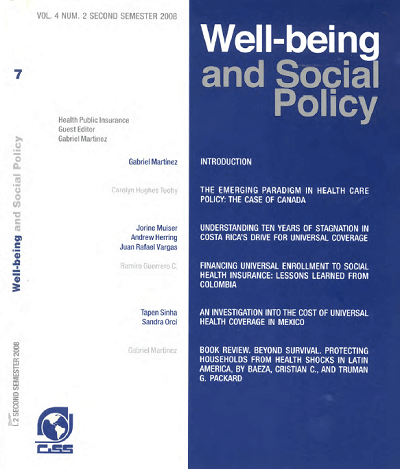
|
|
|
|

|
|
Economic and socio-demographic determinants of crime in Uruguay
This study estimates a panel data model to analyze the economic and socio-demographic determinants of crime in Uruguay across the 19 Uruguayan departments in the period 1986-2006.
This research has two components: i) to present a systematic analysis of the Uruguayan crime data and socio-economic and demographic characteristics of the population, and ii) to evaluate the empirical significance...
|
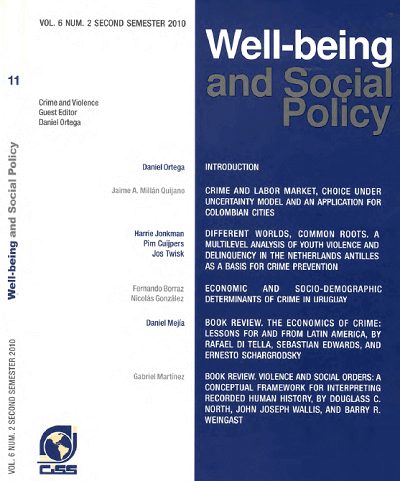
|
|
|
|

|
|
Book review. Violence and social orders: a conceptual framework for interpreting recorded human history, by Douglas C. North, John Joseph Wallis, and Barry R. Weingast
Why societies differ in their level of violence? This is the question addressed by North, Wallis, and Weingast. To provide an answer they must develop a rich theory of how individuals and organizations that compose a human group voluntarily surrender their will to act violently in exchange for participating in a society with improved conditions for the creation and conservation of wealth.
|
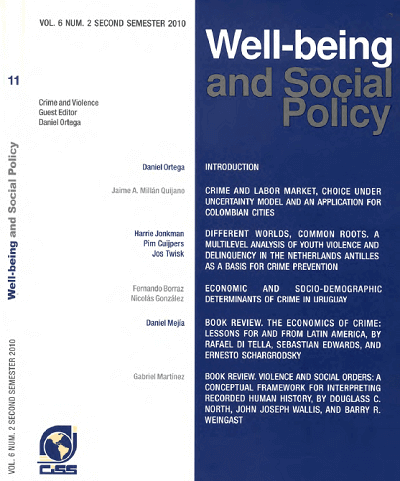
|
|
|
|

|
|
Orientaciones de la seguridad social en América Latina
La búsqueda de la seguridad, individual, familiar y colectiva, ha sido siempre uno de los instintos históricos básicos de la humanidad, desde sus primeros tiempos. Clanes, tribus, hordas, imperios, fraternidades, órdenes, guildas, clases, sindicatos, asociaciones de toda índole, han reflejado en la historia, a través de los tiempos, el egoísmo individualista y la solidaridad Colectivista, que...
|
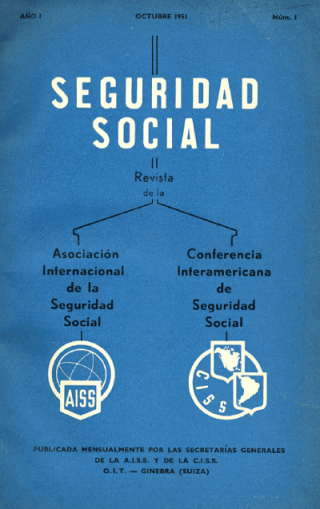
|
|
|
|

|
|
MSMES in Costa Rica: Chronicle of their poor integration in times of accelerated international integration
El presente documento, está centrado en las Mipyme y en las políticas públicas para su fomento en la economía costarricense. El análisis, se hace a partir de un enfoque alternativo de clasificación de las actividades económicas, el cual permite precisar con mayor detalle las desigualdades entre las actividades tradicionales de amplia trayectoria en la economía, de aquellas actividades que han...
|
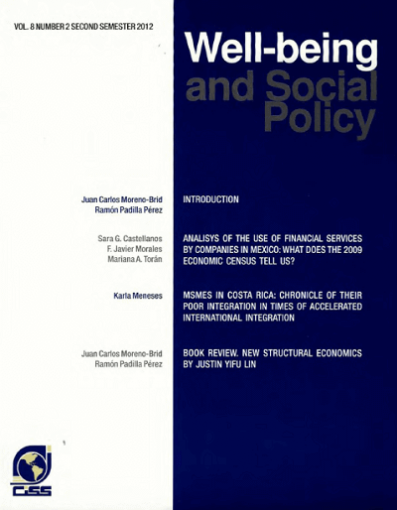
|
|
|
|

|
|
Palabras de introducción
Palabras de introducción al primer número de la Revista de Seguridad Social que se publica bajo los auspicios conjuntos, de la Asociación Internacional de Seguridad Social y la Conferencia Interamericana de Seguridad Social.
|
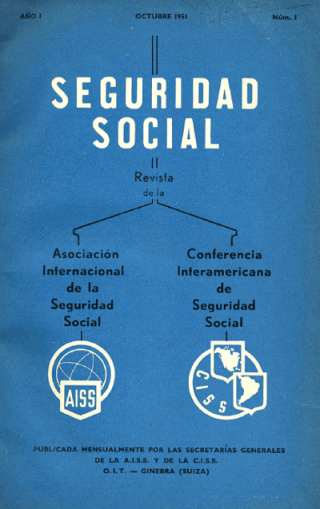
|
|
|
|

|
|
Public spaces in Mexico as social cohesion promoters: an structural modeling perspective
This research assessed the effects of several contextual factors (e.g, neighborhood insecurity, evaluation of public spaces, infrastructure, low risk behaviors) on social cohesion and residential satisfaction, in the context of low and medium-low socio economic status of individuals nearby renovated public spaces (parks and recreational facilities) in Mexico. The research method is based on...
|
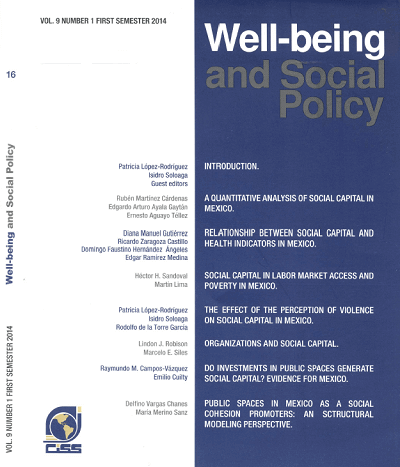
|
|
|
|

|
|
Do investments in public spaces generate social capital? Evidence for Mexico
The formation of social capital is critical for developing countries. This paper investigates the effects of attempts to recover public spaces in marginalized areas of Mexico. The effects are estimated through balancing in the propensity scores. We focus on the results of perception of safety, support and social capital. When efforts are made to recover public spaces, the perception of safety...
|
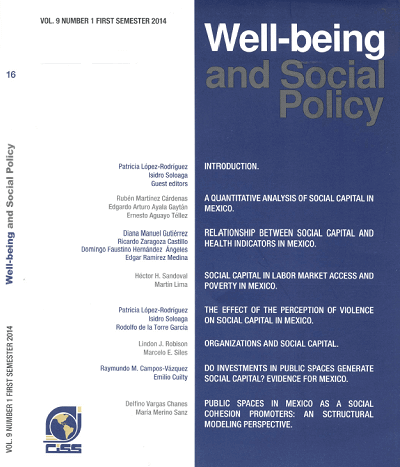
|
|
|
|

|
|
Organizations and social capital
An organization is a group of persons who satisfy established membership requirement and whose form and function are generally acknowledged. An organization's membership requirements may be based on inherited or earned traits. Organizations exist because they provide a setting in which members with similar traits can meet their physical and their socioemotional needs. As the relative importance...
|
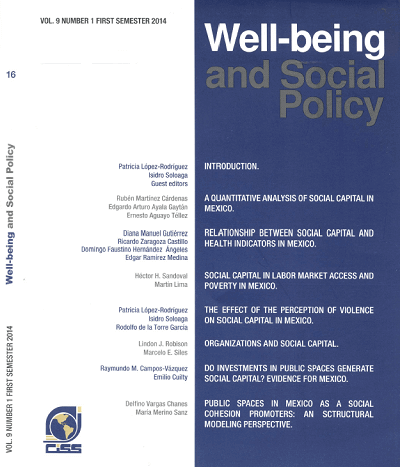
|
|
|
|

|
|
The effect of the perception of violence on social capital in Mexico
Increasing levels of violence in Mexico, which have the potential to damage the very fabric of 1 society, as well as impact key economic variables, led us to analyze the effect that changes in the perception of violence had on social capital fluctuations (including associative capital) between 2006 and 2011. This was a period in which an anti-violence and anti-organized crime policy was launched...
|
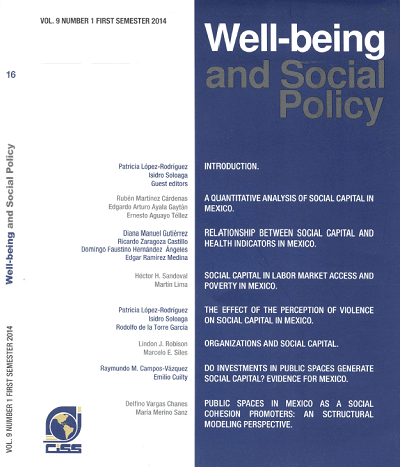
|
|
|
|

|
|
Social capital in labor market access and poverty in Mexico
Social capital, defined as the set of social networks that a person has in order to obtain benefits, is used by the population as a mechanism for providing resources, to cushion shocks in consumption and to obtain information on available employment opportunities. This study employs a logistic model to characterize the manner in which people access the labor market in Mexico through the use of...
|
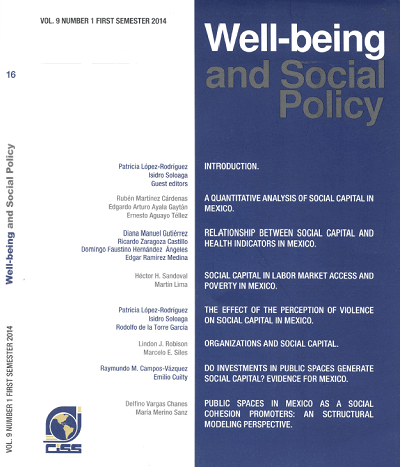
|
|
|
|

|
|
Relationship between social capital and health indicators in Mexico
This study analyzes the relationship between social capital types and access to health services in Mexico. To this end, access to healthcare data from the 2006 ENCASU and 2011 ENCAS was validated using 2006 and 2012 ENSANU results. Indicators were found to be consistent. A statistical analysis of the distribution of social capital and health indicators by region, as well as by rural or urban area...
|
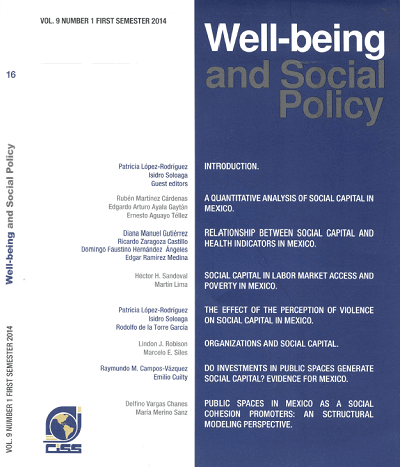
|
|
|
|

|
|
A quantitative analysis of social capital in Mexico
Se ha relacionado el capital social a la eficiencia en los mercados (Arrow, 1972), al refuerzo del contrato (Durlauf y Fafchamps, 2004) y en general al desarrollo y bienestar (Keefer y Knack 1997; Putnam 2000; Knack y Zak 2003). En el presente trabajo hemos investigado los determinantes del capital social empíricamente, centrándose en tres medidas comunes aproximadas de este: dos ligadas a la...
|

|
|
|
|

|
|
Introduction (On the issue of social capital that is addressed in this issue of the journal)
In recent decades, interest has increased in identifying, estimating and linking social capital to a variety of well-being variables in which the production of certain benefits or performance is key. Research has involved the confluence of several disciplines: economics, sociology, anthropology and psychology, to name a few. Although consensus on the definition of a single indicator for measuring...
|
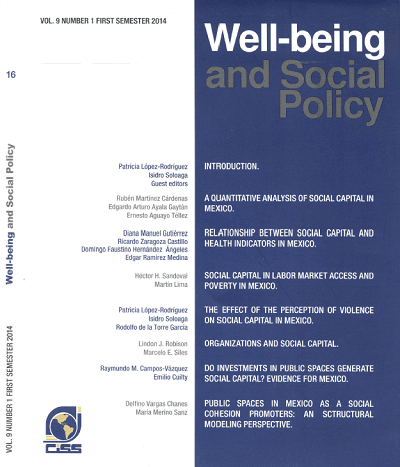
|
|
|
|

|
|
Book review. New structural economics de Justin Yifu Lin
The international financial crisis of 2008-2009, its impact on economic activity and contrasting I responses to face it have given new impetus to the debate Between academics, international organization representatives and public officers on the scope for public policies to reduce the adverse impact of externa) shocks and trigger sustainable long-term growth in production and employment. The...
|
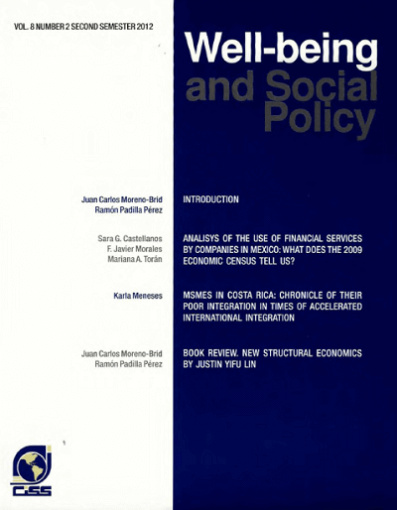
|
|
|
|

|
|
Analysis of the use of financial services by companies in Mexico: What does the 2009 Economic Census tell us?
We present a descriptive analysis of the results of Mexico's 2009 Economic Census regarding the use of bank credit and accounts by productive entities (companies). INEGI was requested to prepare a set of statistics regarding various company characteristics that are relevant to the decisions made by institutions offering banking services. Information was grouped according to company size and to...
|
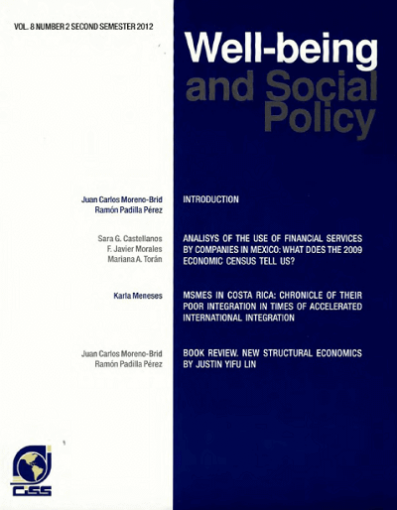
|
|
|
|

|
|
The health insurance reform in the Netherlands and its relevance for Mexico
Alrededor del mundo se observan dos versiones de la organización de los seguros de salud; la seguridad social basada en el empleo, y los servicios nacionales de salud. En Latinoamérica regularmente se usa la primera, pero se está lejos de lograr la cobertura universal. En los Países Bajos encontramos una peculiar mezcla de obligaciones públicas y responsabilidades privadas. La cobertura universal...
|
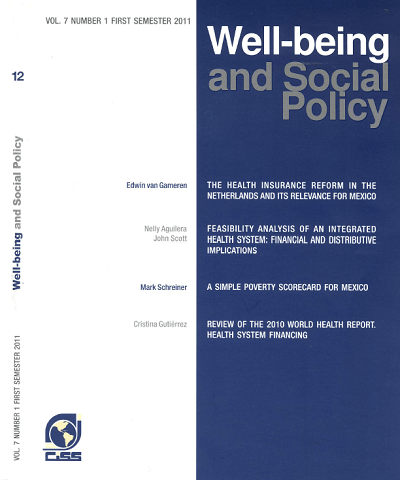
|
|
|
|

|
|
Introduction (On the issues addressed by this issue of the journal)
Micro and small-sized enterprises (MSE) have a central role in economic development in Latin America given their large contribution to employment generation, their share in the total number of firms and, to a lesser extent, their contribution to gross domestic product. Yet, their production is mainly oriented to the domestic market and they are characterized by an increasing productivity gap with...
|
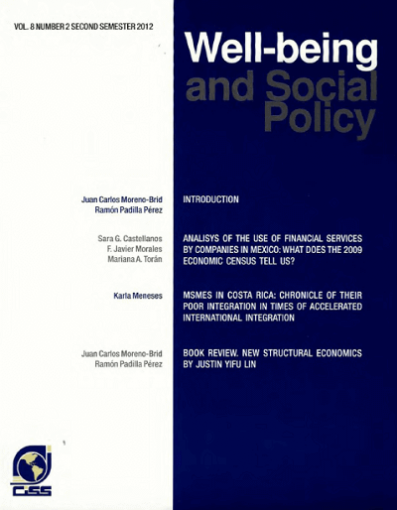
|
|
|
|

|
|
Book review. Empleo, trabajo y desigualdades en salud: una visión global. Joan Benach, Charles Muntaner, Orielle Solar, Vilma Santana y Michael Quinlan
This is a stimulating book which explores the relationship between employment conditions and health outcomes. The authors provide a conceptual framework to illustrate the channels through which health outcomes are determined and affected; this framework includes individual and aggregate variables, such as the economic, political and environmental conditions. The book also includes case studies...
|
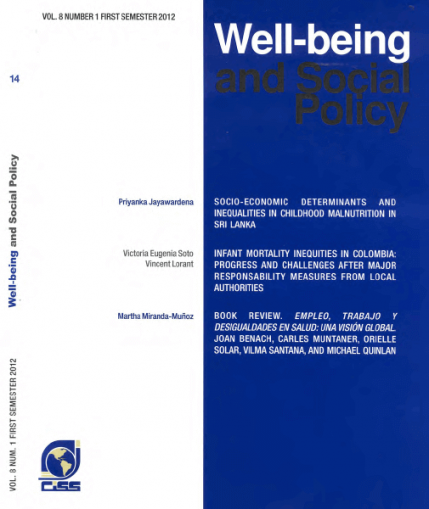
|
|
|
|

|
|
Infantil mortality inequities in Colombia: Progress and challenges after major responsability measures from local authorities
This paper aims to analyse the space and time distribution of the infant mortality rate (IMR) at municipality level in Colombia before and after conferring greater responsibilities to the municipalities for the administration of the local health care systems. Using special econometrics, we find that there is a geographical concentration of IMR persisting over time and defining two groups of...
|
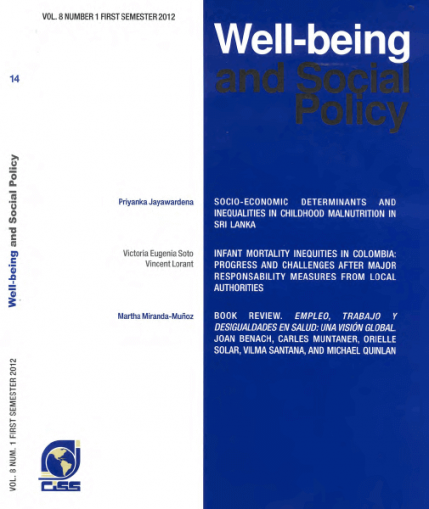
|
|
|
|
|